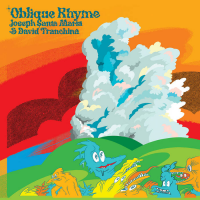Home » Jazz Articles » Album Review » Joe Santa Maria & David Tranchina: Oblique Rhyme
Joe Santa Maria & David Tranchina: Oblique Rhyme
Saxophonist Joe Santa Maria and bassist David Tranchina's Oblique Rhyme is as bold and multi-hyphenate as any of those works. The two may headline the record, but one look at the set list reveals their aims to be profoundly collaborative. They are joined by pianist Gary Fukushima and drummer Colin Woodford. Each player composes at least one track, a rare and demanding choice when the artists are of radically different styles. It is as scatterbrained as you might expect, brash and obtuse in its varied collection of influence from hard bop to New Age ECM—but none of these traits are entirely unwelcome. In fact, it makes for an exciting evening's listen more than anything. These four musicians at the height of their compositional prowess and collective technique spend a session poking and prodding at their peers' work, picking at them like scabs, anxious to let those hidden facets of the piece bleed through.
The majority of the tracks are written by Santa Maria. He proclaims Ornette Coleman as a major influence on his compositions, and while there are certainly phrases lifted from the sharp funk of Coleman's Of Human Feelings-era work, his playstyle drips further into the orgiastic, saccharine licks of Art Pepper. He is on his feet and straight to the pulse—oozing blues and even smoother textures near the song's extremes, ably aggravated by Woodford's off-kilter chatter. "War Crime" is a strange, sweltering introduction to the record, with horn and bass at their most frenetic, while the later "Caricature" flows further into modal territory, adding a plaintive edge to Santa Maria's rampant dadaism.
"Mood of Mind" and "Prism" pull Santa Maria further into murkier New Age territory. The two tracks were written as short exercises in roughly the same period, betraying more ambient tones for the group to tinker with. Fukushima and Woodford get a bit lost in these recordings, seemingly left little meat to chew on in the middle sections, though Tranchina's contemplative fingering is not to be missed. Piano and drums receive their triumphant moment in the Fukushima-penned "Sum Thymes," perhaps the most abstract work on the album. Fukushima weaves around Woodford in a series of intelligent mini-structures floating in mid-air as their determined bandmates soar and screech to catch up to them.
Tranchina's tracks are by far the most rewarding, even as they allow the bassist to take a back seat. His first song, "Hidden Lake," is a simple light-footed adagio, focused on drawling bow work to complement Santa Maria's elegiac crooning. In "Ambient Ambiance," the listener is treated to knockout synth work from Fukushima, not far from what one expects from a particularly left-field Vangelis score, while Tranchina rightly sticks to the basics for his own playing. The record's closer, "Picking Up the Pieces," is as moody as they come, sopping wet with the blues and yet never sacrificing the renegade Woodford and Fukushima's avant-garde tendencies, resulting in some exciting contracts between percussion and sax. Tranchina's works keep their lines soft and colors mellow in order to egg on his bandmates. In turn, it is a joy to track their doodles down the page, newly emboldened by the group's egalitarian structure. The results go beyond surrealism and instead register as precise emotional exorcisms, like children finally told to draw outside the lines.
Track Listing
War Crimes; Hidden Lake; Mood of Mind; Sum Thymes; Prism; Ambient Ambiance; This Must Be For You; Caricature; Picking Up the Pieces
Personnel
Additional Instrumentation
Joe Santa Maria: alto sax; Gary Fukushima: synthesizer.
Album information
Title: Oblique Rhyme | Year Released: 2025 | Record Label: Orenda Records
Tags
PREVIOUS / NEXT
Support All About Jazz
 All About Jazz has been a pillar of jazz since 1995, championing it as an art form and, more importantly, supporting the musicians who make it. Our enduring commitment has made "AAJ" one of the most culturally important websites of its kind, read by hundreds of thousands of fans, musicians and industry figures every month.
All About Jazz has been a pillar of jazz since 1995, championing it as an art form and, more importantly, supporting the musicians who make it. Our enduring commitment has made "AAJ" one of the most culturally important websites of its kind, read by hundreds of thousands of fans, musicians and industry figures every month.






















